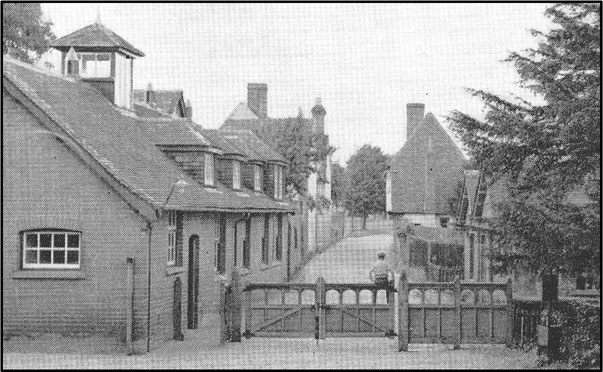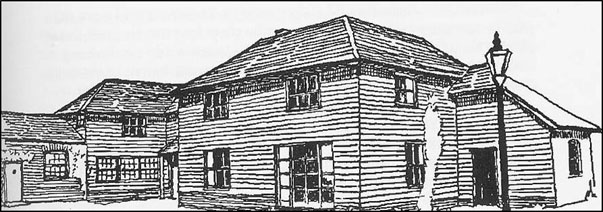Blencowe funded Charity Schools in Writtle and Roxwell, Essex
As Sunday was the only day of the week when the poorest children weren't expected to work on the land in rural areas or in factories in the towns, the Sunday Schools, established in the 18th Century were the first opportunity for many children to gain the basic skills of education and religious knowledge. The brightest pupils then went on to the Public Schools. There were private boarding schools in Writtle for the children of wealthy families.
Good schooling generally was only available to those children whose parents could afford it and so John Blencowe, in a codicil of his will dated 10th Oct 1774, designated the sum of 'twelve hundred pounds to be disposed of, applied to, and for the education of the Poor of the Parish of Writtle and Roxwell in the County of Essex in the instructing them in the religious worship of God according to the established doctrine of the Church of England.'
In 1785 the charity was set up by the Court of Chancery with one school for Writtle and another for Roxwell, the idea being to extend education to the children of the poor to keep them from running wild in the streets. The syllabus was very limited and the standard achieved was low, however, it did provide elementary education for the very poor. The low salary of the master would not have attracted a well qualified teacher.
Regulations for the children: Only children of Writtle and Roxwell families were admitted with preference given to those parents least able to pay for their children's education. If they were absent six times in a quarter they were expelled. They must say their catechism publically in church. Holidays were two weeks at both Christmas and Whitsun but they may go gleaning in the wheat and barley harvest and to pick up hops in the season with written permission from the trustees. Children should attend school for 8 hours a day in summer and 6 in winter. School leaving age for boys was 12 and 10 for girls. They must not attend with an infectious disease. A fire would be kept on at the school between 1 Nov and 25th March during school hours. The Trust would provide pens, ink, paper and proper books. On leaving school each child would receive (unless expelled) a new Bible, Common Prayer Book and 'Whole Duty of Man' at the discretion of the trustees. Children could be expelled for misbehaviour.
Rates of pay: The master and mistress were awarded three shillings per quarter per child that they taught to read, with an addition of 18d per quarter for every child they taught to write. In 1820 a report showed that all the children could read but only a third could write.

School erected in Writtle churchyard c.1820. Photo 1960
In 1829 the trustees of the Blencowe Charity were empowered by the Lord Chancellor to incorporate the children from the Charity school with the National School in Writtle.
The problem of attendance was a common one and the Vicar reported on his National School in 1839: 'The children of the Parish are almost all engaged in various manufacturies as soon as they are eight, and it is difficult to persuade them to come to school even for part of a week.' In 1878 the Trustees for Blencowes Charity reported that Her Majesty's Inspector had reported that the National Schools in Writtle were inefficient and that the Master and Mistress must retire. A request for a pension of £25 per annum was refused even after 30 years service to the schools. The Charity Commissioners advised the Trustees to close the National Schools and set up a scheme of scholarships for the 'deserving children of the poor' in the Parish. Payments from the Charity funds were paid in to both the Highwood and Writtle Schools until the formation of a school board in 1888.
One of the earliest educational establishments in Roxwell was a boys' boarding school called the Roxwell Academy, established in 1760 in what is now known as Roxwell House. The Blencowe Charity, which was started with £1,200 from the will of John Blencowe 1774, was used to help the poorer children in Roxwell and Writtle. Some 20 children supported by the charity were sent to the Roxwell boarding school. By 1820 there were 25 charity pupils. All children were to attend church on Sunday and religious instruction was an integral part of the day with visits from the Vicar and other clergy. Church music was practised for an hour on one morning a week.
Author of Early History of Schools in Writtle 2010, Wendy Hibbett, says the Blencowe Charity was very important in the first days of schooling for the poor and is still applied now but to a much lesser degree. From 1905 some money was used for religious instruction in the Sunday school, and also for providing books for the school library and prizes for proficiency in arithmetic for the boys and needlework for the girls. The residue was used for the advancement of education in the way of bursaries at Secondary schools. Nowadays the Sunday school is very small, but some money is spent on bibles for attendance etc.

Roxwell House
John Blencowe's branch of the family became prosperous in London and he was thought to be the last of that line. However, I speculated that Thomas Blencowe of Stock near Chelmsford, 18thC Surgeonis Mate of H.M.S. Dragon, was his nephew; Thomas in turn was ancestor of Blencowes in London and Essex. Recent DNA studies suggest that this was correct.
Jack Blencowe
Oxford